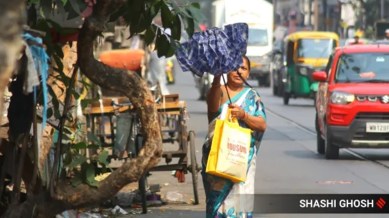Click here to join Express Pune WhatsApp channel and get a curated list of our stories
Health risk from excessive heat rising in India, says new Lancet report
Suggests targeted interventions for vulnerable populations, changes in working hours to reduce impact.

Targeted interventions for vulnerable populations and changes in working hours, particularly for those working outdoors, are some of the essential measures that India needs to take to arrest the increasing risk of heat-related health impacts on its people, says a new Lancet report on climate change and health.
The report, an annual publication that tracks climate impacts on human health at the global level, has pointed out that health-threatening temperatures are getting increasingly prolonged in India. In 2023, every person in the country was exposed to at least 2,400 hours of heat, equivalent to 100 days, that could have resulted in moderate to serious heat-related diseases, says the report.
The 2024 report of the Lancet Countdown on health and climate change notes that 10 of the 15 indicators it uses for monitoring climate change-related health hazards globally have reached “concerning new records”.
In India, besides the risk of heat-related diseases, the report has flagged potential health impacts from rising instances of flooding, increasing vulnerability from infectious diseases, and high levels of air pollution, all of which are getting exacerbated due to climate change. But the biggest risk, according to the report, is from heat because of which about 181 billion potential labour hours were lost last year, an increase of 50% from the 1990-1999 annual average.
Dileep Mavalankar, former director of Indian Institute of Public Health, Gandhinagar, told The Indian Express that there was an immediate need to develop heat action plans in each city and town and implement them with full effort.
“Adequate budget has to be provided for this by the governments. We should learn from the Ahmedabad heat action plan, which has been implemented since 2013 and has shown positive results in terms of reduction in mortality; this is documented in published scientific papers,” he said.
Poornima Prabhakaran, director of Centre for Health Analytics Research and Trends at Trivedi School of Biosciences, Ashoka University, who co-authored the India policy brief in the report, said the increasing burden of heat and flood-related illnesses and climate-sensitive infectious diseases warranted urgent and strategic measures that are both data-centric and decentralised.
“Existing and new financing mechanisms must be unlocked to set up and scale sector-specific heat and flood adaptation plans. Timely identification of heat, flood and vector-borne disease hotspots through innovative modelling techniques will facilitate the development of action plans and their implementation. The cost of climate inaction can be disastrous and only collective measures can mitigate the climate crisis for India,” she said.
The report says that about 38% of the nearly 1.6 million deaths that were attributable to air pollution in 2021 could be blamed on high usage of fossil fuels. It notes the rising share of renewable energy in India’s energy mix, but says more needs to be done.
“Redirecting fossil fuel subsidy funds to incentivising the expansion and affordability of low-carbon power and to health-promoting interventions would deliver net benefits to local populations, and support a just transition,” the report says.
But Kalpana Balakrishnan, director of WHO collaborating centre for Occupational and Environmental Health, Sri Ramachandra Institute of Higher Education and Research in Chennai, said energy transition needs to be handled very carefully.
“We all recognise the need to reduce fossil fuel dependency. However, the shift toward cleaner energy must be managed in a fair and inclusive manner. It cannot come at the cost of basic level energy access to most vulnerable and marginalised communities throughout the world,” she said.
Click here to join Express Pune WhatsApp channel and get a curated list of our stories